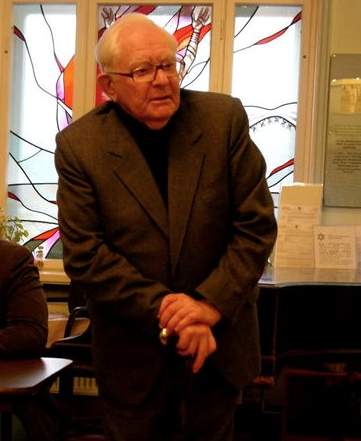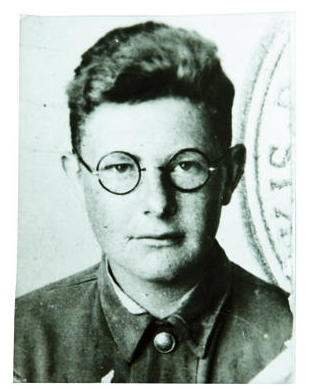Riga Holocaust Archives - INTO THE LIGHT
Interview: Dr. Margers Vestermanis, Holocaust Survivor, and Author Susan Beilby Magee
On , | One Comment | In Holocaust, Riga, Riga Holocaust, Uncategorized | By

Dr. Margers Vestermanis, founder of the Museum and Documentation Center “Jews in Latvia.” (photo: Wikipedia)
In honor of International Holocaust Remembrance Day, I share a recent interview with Dr. Margers Vestermanis, Holocaust survivor, historian and expert on the history of Jews in Latvia. Born in Riga in 1925, he endured the horrors of the Holocaust. He escaped from the death march from the Dundaga concentration camp to the sea in the summer of 1944 and joined a group of partisans in the forests of Northern Courland until the war ended. After the war, he studied history in Riga, earned his PhD, and became an archivist in the State Historical Archives. He was dismissed in 1963 for writing a paper about the Holocaust, and he then worked as a high school teacher for many years. In 1990, following the Independence of Latvia, Dr. Vestermanis founded the Museum “Jews in Latvia” and served as its first director for many years.
I first met Dr. Vestermanis in Riga in 2004 when I was researching Kalman Aron’s life for my book—INTO THE LIGHT: The Healing Art of Kalman Aron. He kindly agreed to an interview in his office at the Jewish Community Center in Riga. Ten years later, I returned to Riga to present Kalman Aron’s story at an international conference at the same Jewish Community Center. Dr. Vestermanis agreed to a second interview to reflect on his experience and what he learned about human nature.
His responses to my questions are powerful, profound and insightful. I thank Dr. Margers Vestermanis for letting me share them with the world.
During the Holocaust, about 70,000 Latvian Jews lost their lives. Dr. Vestermanis has devoted his life to preserve the memory of Jewish life and culture in Latvia. He remains a vibrant voice, reminding us to “never forget.” I honor him and welcome your responses which I will share with him.
______________________________
Magee: What words can you use to describe the evil you experienced and how it affected your heart and soul?
Vestermanis: It was the first time that we felt outcast; we felt that our pain and the torture of death hardly disturbed anyone. It did not matter neither to our local society, nor to the rest of the world. This injury we, as individuals that survived the Holocaust and as the Jewish society as a whole, will harbor in our souls until the end of the days.
Magee: What is your understanding or view of human nature in general?
Vestermanis: A human is an egoist by nature. Love to our family and relatives, as well as friendship, should be brought up by our family members, teachers at school, and, in the end, by the society and the state. Of course, even the inveterate egoist feels the necessity of doing something good, positive, but usually this spontaneous glimpse is extinguished by arguments and ice-cold calculation.
Magee: What have you learned about your own nature?
Vestermanis: It is said, that a human comes from his or her childhood, from ancestral home. I come from a family focused on German culture that would decline even thoughts of possible assimilating. In contrast, there was cultivated the feeling of Jewish national pride for our input into civilization and culture. Since I was six years old, a private Rabbi taught me the Holy Scripture and other ancient Jewish books that were perceived in my family not as religious tenets, but mythological basics of our national culture. This sense of significance of our people, high national self-consciousness was, with no doubt, the most important and decisive aspect that helped me to survive the Holocaust.
Magee: How did you survive? What resources within yourself did you use to survive?
Vestermanis: Surviving the Holocaust was a mere accident. I was young, physically strong, and, what is the most important, I saved the will to resist. After several unsuccessful attempts to escape, an accident helped me: the concentration camp Dundaga, where also Kalman Aaron was held, due to the approach of the Red army in the end of July in 1944 was moved in a strong pace of “death march” to ports in Liepaja and Ventspils. Many people died on the way, but when our path ran through the forested place under Ugale, many people made the last effort to jump over the ditches on the sides of the road and rushed to the forest. I was one of them. I managed do join the antifascist partisan troop of Latvian people, who did not want to join the SS legion. In our troop, there were also soviet prisoners who escaped from German camp and even one German deserter (defector) Obergefreiter “Luftwaffe” (driver of anti-airforce artillery) Egon Klinke, who became my friend later.
The western side of Latvia later transformed into “Courland pocket”, where the Red army locked about 300 000 German soldiers – 16th and 18th Wehrmacht armies that could not escape from the “pocket” up to 9 may 1945. During this time the armies hurled all effort into going through forests searching for those who escaped, and on the 26th of December our troop was destroyed. My German friend Egon and I were among the few people that managed to break through, but after 5 days – on the New Year night of 1945 I lost my friend too, and until 9 may 1945 I was wondering around the forest as an “armed partisan loner”. I would like to highlight that without help from a friendly part of Latvian people I could not survive in the forest during the time of “Courland pocket”. Professor of the University of Jerusalem Dov Levin, historiographer of the resistance of Baltic Jews, writes: “Marger Vestermann was the last Jewish partisan of the World War II, who met the day of German capitulation going out of the forest with weapon in his hands.” This is only partly true – one more armed partisan was the other former prisoner of Dundaga concentration camp Jakov Rossein, who has already passed.
Magee: How did the Holocaust inform the choices you have made in your life since and how have you found meaning, given the experience?
Vestermanis: I would like to answer your fifth question with the words of the great “hunter of Nazi war criminals” Simon Wiesenthal. He writes: “When I will die and fall into another world, the millions of souls of killed Jews will surround me and ask: “What did you do with your life, that you managed to save?” I could answer in many different ways, but I will tell them the most important thing: I did not forget you! (ich habe euch niche vergessen)!” Of course, it would be a sacrilege to compare myself with the famous Wiesenthal. However, his words were “credo” of all my “post-Holocaust life”: I devoted myself to preserving the memory of the world of Latvian Jews that died in horror, tears and seas of blood. This duty, this mission will not leave me until my last breath. And I am happy that it so happened.
Magee: How are Riga and Latvia different today? How are they the same?
Vestermanis: Latvia and Riga had never known brutal anti-Semitism; however, it existed, and still exists, in a latent form. Our major difference is that currently the recognition of our suffering is not enough, we demand the principal condemnation of those who are guilty, “our” murderers, a part of which as “displaced persons” escaped the responsibility on the West. The other part of them was arrested and condemned by the Soviet authorities of KGB, not always objective. Their families also suffered, they were deported to Siberia. Guilty or not – all of them are considered victims of the “red terror” and national martyr, to which are dedicated monuments, museums and so on. They use their special status. This inability and unwillingness to deal with the dark spots of national history are “neurological sensitive points” in our, in fact, good relationships.
Magee: What wisdom/what message do you wish to give the world and particularly to the children…to your grandchildren’s generation?
Vestermanis: To the children, grandchildren, and great grandchildren – to learn to live together, in peace. Peace is the main thing that our ancestors were dreaming of, and what we, the generation that went through all the flames of hell, bequeath to the entire world and to America as well.
Magee: What message do you want me to take home to Kalman Aron in America?
Vestermanis: I wish him – take it easy, my friend! Search for the last, the most important theme. For me it is still Holocaust.
My cousin, who subsequently survived in concentration camp Buchenwald, Boris Lurne, and who later in the States became one of the “apostles” of a new art movement called “No-art” shortly before his death sent me a large poster – on the black background with a yellow paint was pictured something strange, scary and unimaginable, like a nightmare. This work he dedicated to our common, eternal theme – Holocaust. In my opinion, it is the most exact attempt to deliver graphically to the consciousness of people something that can be called “unimaginable”. Good luck, my friend!
© 2015 Susan Beilby Magee

